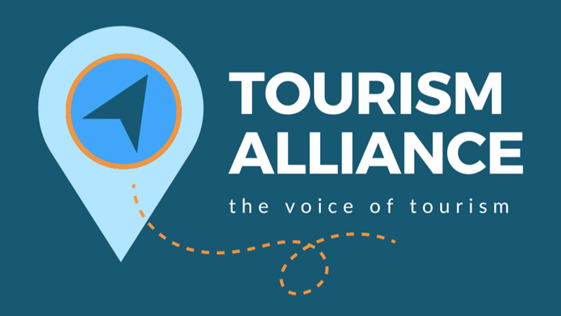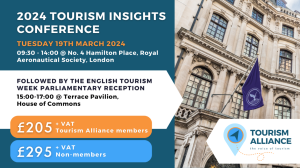In this newsletter: 70 tourism organisations sign joint letter on UK-EU youth mobility Retail sector…

Tourism Alliance update
Happy New Year
Greetings, best wishes, and a happy 2024 to all Tourism Alliance members. We have an exciting year ahead – events, webinars, conferences, tourism policy manifesto publication, Labour candidate outreach events, breakfast briefings, party conference activities, consultation responses, research papers to publish….and a general election to look forward to (!?).
In this update:
- Accessibility and Inclusive Tourism Toolkit Webinar
- HoC inquiry into EU Entry/Exit System – deadline approaching
- Insights Conference and Parliamentary Reception
- The Telegraph: “The countries that would survive if Europe’s tourists vanished”
The Times: No passports needed under Border Force e-gate plan
Accessibility and Inclusive Tourism Toolkit Webinar

The Tourism Alliance is hosting a webinar with VisitEngland to provide TA members with an introduction to VE’s new Accessible and Inclusive Tourism Toolkit and how it can help tourism businesses improve the customer experience.
The toolkit is freely available on VisitEngland’s Business Advice Hub and can help businesses understand and address the barriers faced by customers with different accessibility requirements, effectively promote their accessibility information, become an inclusive employer and more.
Speakers include toolkit author Emily Yates, Head of Accessibility and Inclusive Design at Mima, and Ross Calladine, Accessibility & Inclusion Lead at VisitEngland and Government-appointed Disability and Access Ambassador for Tourism.
📅 Monday 5th February
⏰ 11:00-11:45
🏢 Online Webinar
Pre-registration is required – please do so now.
HoC inquiry into EU Entry/Exit System – deadline approaching
You may recall that the House of Commons European Scrutiny Committee is currently accepting written evidence in its inquiry into “EU Entry/Exit and the UK border”. The deadline for written submissions is Friday 12 January.
In our last Weekly Update we noted the widespread reporting that EES was expected to start from 6 October 2024. This has still not been confirmed by the EU side, and there is some doubt now about the veracity of that reporting – so take it with a pinch of salt until we get the official word. But autumn this year is still expected. That we do not have an official date of the start of this scheme at the start of 2024 is unfortunate, to say the least.
Ryanair’s evidence to the Committee has already been published and is written in their inimitable style… It focuses on the technical challenges faced by carriers, especially the scant detail on what they will actually need to do, and crucially, when. These points were also raised by the Port of Dover, Eurotunnel and Eurostar at their oral evidence session earlier in the year.
These points are well made. We will be raising a number of issues in our submission to the HoC Committee, especially as it relates to queues and complexity for tourists traveling to the EU.
It is highly likely that the introduction of the scheme is going to result in more queues at the EU border wherever travellers hit it – whether that be on arrival at airports in the EU (NB Ireland and Cyprus are not part of EES), or at the three juxtaposed borders here in the UK at Dover, Folkestone and St Pancras. It is these three juxtaposed borders where much of the concern lies.
On initial enrolment into EES travellers will need to provide biometrics – fingerprints and a photograph. On subsequent border crossings only a photo will be needed. Both cases present logistical challenges at the juxtaposed borders, but especially the fingerprinting. An app is being developed so travellers can (but are not required to) provide some of these details before travelling, but fingerprints will have to be given in person. When EES first rolls out everyone’s first trip across the border will entail enrolment – therefore there is significant concern about queues and disruption. And the public is far from aware of all of this happening.
Alongside which is ETIAS – the advance travel permission system which will come in six months later.
So, concerns and challenges around this are legion, and we will be pointing them out to the Committee. Ultimately the question we will be raising is – although this is a natural, logical, and legal consequence of our leaving the EU, is it really necessary? Put another way – can we move towards a comprehensive EU-UK mobility agreement which removes these unnecessary barriers to travel and trade in the longer term?
Insights Conference and Parliamentary Reception

A reminder to book your place at our Tourism Insights Conference being held on 19 March 2024, co-hosted with the Family Holiday Charity in conjunction with VisitEngland. A ticket to the conference will also give you a place at our prestigious English Tourism Week Parliamentary Reception that same day.
We have some really great speakers and panels being lined up which will be announced soon. Book your place now.
We also have a range of sponsorship opportunities available for both the conference and the Parliamentary Reception
📅 19th March 2024
⏰ 0930-1400
🏢 No. 4 Hamilton Place, Mayfair, London – home of the Royal AeronauticalSociety.
💷 £205-£295+VAT
The Telegraph: “The countries that would survive if Europe’s tourists vanished”
There was a very interesting piece in the Telegraph over the Christmas period from Chris Moss, the paper’s “Destination Expert” looking at ‘overtourism’ and contrasting the policies some destinations have implemented to restrict or reduce tourism, and the reliance of many of those same destinations on the visitor economy. It is worth a read.
It is also worth reading our report from 2023: “Taxing Tourists” which looks at many of these same destinations and contrasts the taxes paid by tourists there with taxes paid here at home. TL:DR – our tourists pay more taxes than almost all of them.
The Times: No passports needed under Border Force e-gate plan
Ben Clatworthy in The Times reports on new e-gates at the UK border which will remove the need for passengers to present their passports at all by use of facial recognition. Trials are expected this year before a full procurement process for new gates.
